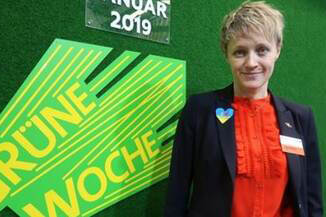Agribusiness drives development technologies in Ukraine, deputy minister says
Once regarded as the breadbasket of Europe, Ukraine is now ready to be the ‘supermarket of the world’ as processed and high-end product manufacturing is booming, Ukraine’s deputy agriculture minister, Olga Trofimtseva, told EURACTIV.com.
EURACTIV spoke to Olga Trofimtseva, Deputy Minister of Agrarian Policy, Food and European Integration, during a working visit to Brussels.

“Speaking of the Ukraine integration in the EU, some of my colleagues often say that it has already overcome the point of no return,” Trofimtseva said, adding that this process was now an integral and natural path of the country’s economy.
She described the current state of the overall relationship between Ukraine and the EU member states as ties are increasingly ever closer in all sectors, but particularly in agrifood.
When asked what Ukraine could offer the EU, she answered “a strategic, reliable and sustainable partnership both at the political and economic level”, but also stressed that Kyiv needs strong support from the EU as the situation with Russia “is not that easy at the moment”.
In her words, economic relations with Ukraine provide substantial benefits for the EU as well, as the two partners are geographically close and Europe steadily ranks second in terms of trade in the agrifood sector.
According to statistics, the biggest share of Ukraine’s agricultural exports is directed to Asian countries (43.5%, top importers are India, China and Turkey), while second place is occupied by the EU countries (31.8%, biggest importers are the Netherlands, Poland and Italy).
Besides Ukraine’s contribution to food security through the traditional primary sector, domestic producers and foreign investors are also interested in profitable niches like processed organic foodstuffs, she said.
Her message to Europe is that the Ukrainian market for technology-oriented products has grown, putting the focus not only on primary production but also on technologies, machinery, processing, infrastructure and logistics.
Supermarket of the world
“Agribusiness is now the driving force for the development of technologies in Ukraine,” she said highlighting the strong interconnection between the IT-sector and the agrifood.
“I don’t like to regard Ukraine as Europe’s breadbasket, but more as the supermarket of the world, because we are providing not only grains and other raw materials but also processed and value-added products,” she said.
The recent development of the local organic farming sector shone a spotlight on the sustainability of the system. More than 80% of Ukraine’s products come from this category and the country recently emerged as a big supplier of fresh and frozen berries.
“Within the national export strategies that we are developing, the EU is seen as a strategic market for Ukraine’s agrifood sector,” she said.
Roughly 300 Ukrainian agrifood companies, including SMEs, hold the EUR.1 Movement Certificate that grants them the right to export products, including for human consumption, in any region of the EU.
“Now the highest priority is to diversify the structure in order to not have such strong domination of primary crops in our export, moving forward to processed products,” she said.
Bilateral trade in agrifood produce has grown 7% compared to the same period in 2017, while Europe had an overall trade surplus of €3.5 billion with Ukraine in 2017.
DCFTA is working
The EU and Ukraine have provisionally applied a Deep and Comprehensive Free Trade Agreement (DCFTA) since 1 January 2016, as part of a broader association agreement dating back to November 2014.
The DCFTA came into force during a dramatic period for Ukraine, when it was forced to look at other markets after the 2014 Crimea crisis.
According to Trofimtseva, the DCFTA is working well, particularly in the agrifood sector: “I do see a positive effect of DCFTA in Ukrainian economy because of the crucial change in the way of doing business,” she said, referring to a change of mentality for Ukraine’s business community.
“In the past, business was heavily oriented on Russian market also because it was simple and understandable for us: we had similar language, similar rules and also similar ways to solving problems with bribes,” she added.
For this reason, she sees the DCFTA as the greatest instrument to make Ukraine a competitive global player in the agribusiness.
On food safety, she noted, the alignment of Ukraine with EU requirements brings also results in terms of working more effectively and providing businesses with a regulatory framework that makes them more competitive.
“In many fields, we had some outdated soviet regulation and standard, and even the management system was not so effective because nobody actually tried to reform it comprehensively. But due to the accession agreement we have new obligations,” she concluded.
[Edited by Georgi Gotev and Sam Morgan]